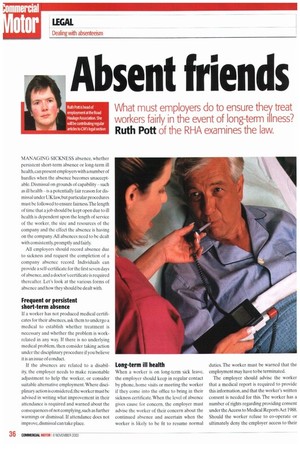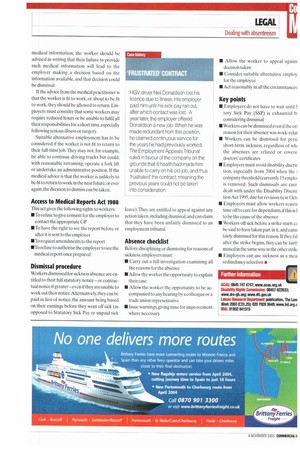Absent friends
Page 36

Page 37

If you've noticed an error in this article please click here to report it so we can fix it.
What must employers do to ensure they treat workers fairly in the event of long-term illness?
Ruth Pott of the RHA examines the law.
MANAGING SICKNESS absence. whether persistent short-term absence or long-term ill health, can present employers with a number of hurdles when the absence becomes unacceptable. Dismissal on grounds of capability such as ill health is a potentially fair reason for dismissal under UK law, but particular procedures must he followed to ensure fairness.The length of time that a job should be kept open due to ill health is dependent upon the length of service of the worker, the size and resources of the company and the effect the absence is having on the company. All absences need to be dealt with consistently, promptly and fairly.
All employers should record absence due to sickness and request the completion of a company absence record. Individuals can provide a self-certificate for the first seven days of absence, and a doctor's certificate is required thereafter. Let's look at the various forms of absence and how they should be dealt with.
Frequent or persistent short-term absence If a worker has not produced medical certificates for their absences, ask them to undergo a medical to establish whether treatment is necessary and whether the problem is workrelated in any way. If there is no underlying medical problem, then consider taking action under the disciplinary procedure if you believe it is an issue of conduct.
If the absences are related to a disability, the employer needs to make reasonable adjustment to help the worker, or consider suitable alternative employment. Where disciplinary action is considered, the worker must be advised in writing what improvement in their attendance is required and warned about the consequences of not complying, such as further warnings or dismissal. If attendance does not improve, dismissal can take place. Long-term ill health When a worker is on long-term sick leave, the employer should keep in regular contact by phone, home visits or meeting the worker if they come into the office to bring in their sickness certificate. When the level of absence gives cause for concern, the employer must advise the worker of their concern about the continued absence and ascertain when the worker is likely to be fit to resume normal duties. The worker must be warned that the employment may have to be terminated.
The employer should advise the worker that a medical report is required to provide this information, and that the worker's written consent is needed for this. The worker has a number of rights regarding providing consent under the Access to Medical Reports Act 1988. Should the worker refuse to co-operate or ultimately deny the employer access to their medical information, the worker should be advised in writing that their failure to provide such medical information will lead to the employer making a decision based on the information available, and that decision could be dismissal.
If the advice from the medical practitioner is that the worker is fit to work, or about to be fit to work. they should be allowed to return. Employers must consider that some workers may require reduced hours or be unable to fulfil all their responsibilities for a short time, especially following serious illness or surgery.
Suitable alternative employment has to be considered if the worker is not fit to return to their full-time job. They may not, for example, be able to continue driving trucks but could, with reasonable retraining, operate a fork lift or undertake an administrative position. lithe medical advice is that the worker is unlikely to be fit to return to work in the near future,or ever again, the decision to dismiss can be taken.
Access to Medical Reports Act 1988 This act gives the following rights to workers: • To refuse to give consent for the employer to contact the appropriate GP • To have the right to see the report before or after it is sent to the employer • To request amendments to the report • To refuse to authorise the employer to see the medical report once prepared Dismissal procedure Workers dismissed for sickness absence are entitled to their full statutory notice — or contractual notice if greater—even if they are unable to work out their not ice.Alternatively, they can be paid in lieu of notice, the amount being based on their earnings before they went off sick (as opposed to Statutory Sick Pay or unpaid sick HGV driver Neil Donaldson lost his licence due to illness. His employer paid him until his sick pay ran out, after which contact was lost. A year later, the employer offered Donaldson a new job. When he was made redundant from this position, he claimed continuous service for the years he had previously worked. The Employment Appeals Tribunal ruled in favour of the company on the grounds that ill health had made him unable to carry on his old job, and thus 'frustrated the contract, meaning the previous years could not be taken into consideration.
leave). They are entitled to appeal against any action taken, including dismissal, and can claim that they have been unfairly dismissed to an employment tribunal.
Absence checklist Before disciplinirig or dismissing for reasons of sickness, employers must: • Carry out a full investigation examining all the reasons for the absence • Allow the worker the opportunity to explain their case • Allow the worker the opportunity to be accompanied to any hearing by a colleague or a trade union representative • Issue warnings, giving time for improvement where necessary • Allow the worker to appeal aga ins decision taken • Consider suitable alternative employ for the employee • Act reasonably in all the circumstances Key points • Employers do not have to wait until 5 tory Sick Pay (SSP) is exhausted hi considering dismissal • Workers can be dismissed even if the on reason for their absence was work-relai • Workers can be dismissed for persi short-term sickness, regardless of wh• the absences are related or covere doctors' certificates • Employers must avoid disability discrir tion. especially from 2004 when the ! company threshold (currently 15 emplo is removed. Such dismissals are curr dealt with under the Disability Discrir lion Act 1995, due for revision next Oct■ • Employers must allow workers reasot time off to care for dependants, if this is I to be the cause of the absence • Workers off sick before a strike starts a be said to have taken part in it. and cann fairly dismissed for this reason. lithe)' fal after the strike begins, they can be fairh missed in the same way as the other striki • Employers can use sickness as a mea redundancy selection •
































































































































































































